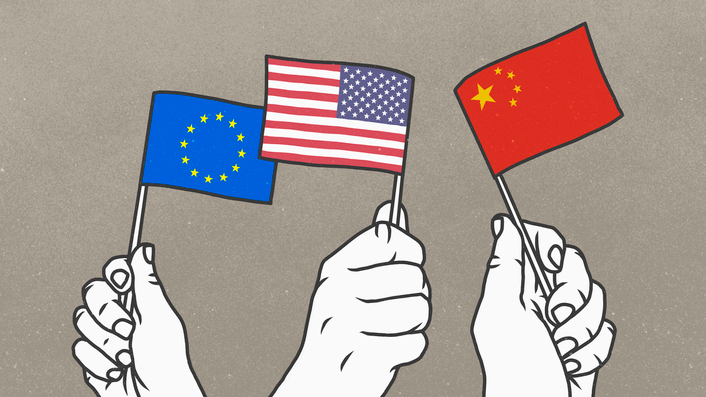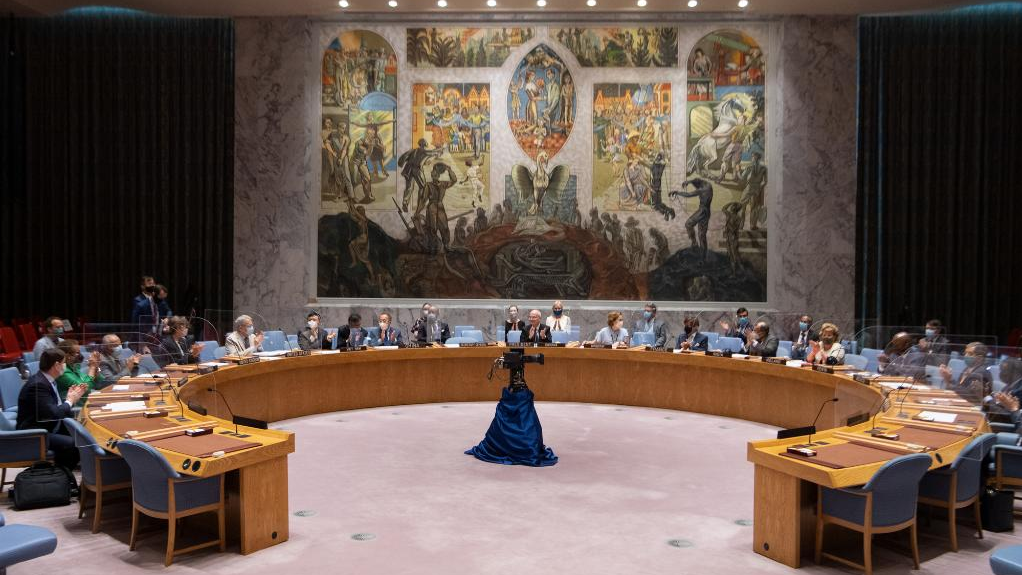
An illustration small European Union, U.S. and Chinese flags. /Getty
An illustration small European Union, U.S. and Chinese flags. /Getty
Editor's note: Markku Siira is a freelance writer and geopolitical analyst. The article reflects the author's opinions and not necessarily the views of CGTN.
China has not traditionally been a country that would impose its own system on others.
Nor has Beijing generally responded in kind to propagandistic denigration.
In recent years, however, China has become more assertive. China is seen to have a good and effective political system and governance, even by objective standards, and there is nothing to be ashamed of.
In the West, on the other hand, there is growing skepticism about the future: the more the West's political system is seriously fractured, the more hostile it becomes to China as a competing power.
More and more people are realizing that the liberal narrative of the West no longer applies. Indeed, the "rules-based international order" has been nothing more than a tool to reinforce Anglo-American hegemony. We are already in a period of transition from the old order to the new.
China is not interested in an American-style role in world politics, so it has not had a clear media strategy on how to compete with the West. China's voice in the arena of Western-dominated public opinion has not yet been matched to its national strength and influence.
In the past, China thought that if it kept a low profile and sought to win a common cause with Western powers, the West would treat China with kindness and respect. Practical experience has shown that such thinking has been too naive.
To express it sarcastically, China-U.S. relations are easily mended. All China needs to do is give up its 5G technology, its space program, its advanced weapons and its economic development, and the Sino-U.S. disputes will disappear.
To remain on good terms with the U.S., any non-Western country should remain weak and obedient and accept the narrative hegemony of the West in the arena of international public opinion. It has never been about democracy and freedom, but about power and autonomy.

A private meeting of the UN Security Council is held at the UN headquarters in New York, June 8, 2021. /Xinhua
A private meeting of the UN Security Council is held at the UN headquarters in New York, June 8, 2021. /Xinhua
Since the United States and its allies have realized that they cannot bring China to submission through a trade war, military pressure, let alone the interest rate crisis, the new battleground has been opinion manipulation. In this game of information warfare, China is still the underdog, as almost all the main international media platforms are in the hands of the Western-dominated elite. I hope this will eventually change: we certainly need more diverse platforms in a forthcoming multipolar era.
The West is using its hegemonic advantage on the battlefield of public opinion to start painting China and construct a negative narrative about China. This is aimed at causing damage and slowing down China's development. It would be in China's national interest to find a solution to this problem as well.
The positive attitude towards China has already been largely erased from the Western media. Anti-Chinese sentiment is becoming "politically correct" in the West, a kind of acceptable racism, expressed by mainstream media columnists as much as by politicians. Fortunately, the West does not represent the majority of the world.
In the emerging third world countries, the image of China is more positive. In Africa, Southeast and West Asia, political elites and citizens support China and its role in the international arena. This bodes well for China's future, even if the West is increasingly hostile to the Asian power.
Of course, China will not be able to convince every country and win over every Western partner, but it can win over the majority of the international community. President Xi Jinping has said that Chinese culture must be presented to the world, while refuting the false myths, rumors and allegations about China.
While some people and nations are still afraid of "offending the West," China should get the U.S. and other Western countries used to being the target of legitimate and constructive criticism.
As a permanent member of the UN Security Council, the only and largest developing country, China represents not only itself, but also 18 percent of the world's population, who also live in developing countries. China must continue to speak up, on behalf of itself and others.
(If you want to contribute and have specific expertise, please contact us at opinions@cgtn.com.)

